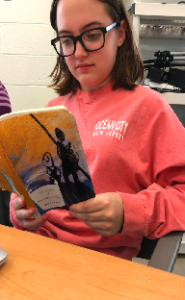Molly Limaye ’21
Kristen Weil ’21
Madison Hanssens ’21:
Despite the lessons that can be learned from them, many schools are banning books such as The Adventures of Huckleberry Finn and To Kill a Mockingbird, due to the use of derogatory terms and racial insensitivity. However, these books can teach students about the history of the United States, how to handle difficult, uncomfortable topics, and prepare them for adulthood where they may have to face such challenges. Mike Letts, Head of Upper School, says, “The job of the school is to teach about realities of world. Pretending they don’t exist inhibits the students’ ability to deal with them by teaching them ignorance. Banning these books sends the message to students that they are incapable of handling difficult topics which belittles and demeans their intellectual capabilities.”

Photo Courtesy: Aantorik Ganguly
When asked why he believes these books are being banned, Upper School English teacher Anthony Herman stated, “I think that these books are being banned to allow all students the opportunity to have an uplifting education where they feel safe. These derogatory terms can make students in class, especially students of color, feel that the word is demeaning them and making them feel less than. Some people believe that exposure to things young minds aren’t ready for can be damaging, although if you take things away from kids and don’t let them experience and wrestle with them while they are younger, it can have as damaging effects when they are older, so it’s better to do it in an educational setting to talk about it in a scholarly way.”
It is very important for all students to feel safe at school, but education is also meant to prepare students for the future. Shielding them from words and concepts that do exist, while it seems to be the safer route, could have unintended consequences later in life. Letts states, “We need to teach adolescents how to grapple with issues in appropriate adult ways and how to handle them with responsibility instead of pretending they don’t exist. Students then go home and turn on the news to hear about issues that are all there anyway.”
As Herman states, it is best to talk about these words and concepts in school, where the discussion is guided and is presented as a learning experience. The Adventures of Huckleberry Finn is read in Upper School and To Kill a Mockingbird is read in Middle School. Heather Dupont, a Middle School English teacher, says, “Atticus Finch [one of the main characters of To Kill a Mockingbird] explains the injustice to children very well, and makes it very understandable for Middle School students. Teachers also do a very good job of explaining to students the inappropriate use of the language in the story, and doing so creates strong educational discussions.”
These books can also teach students about what the United States was once like, and understanding the history is important. Herman states, “ It is important for us to wrestle with issues that are tough in our culture. The n-word in Huckleberry Finn was the operative word that they used in the south at that time to refer to slaves so it is important for us as a culture to wrestle with that word and what has happened with the word and how it has changed.” He continues, “As Americans, part of our civil liberty is that we can tackle books like these in a formal educational setting that is a safe place to get into the deeper meaning of why the author used these terms.” Middle School teachers echo this as Duponts says, “We can’t erase a piece of our history. One of the reasons these books were written is so history doesn’t repeat itself.” Dupont and Herman are correct because by educating the future leaders of the world about matters of the past, we can prevent ignorance and repetition of past mistakes.
Many students agree with Herman’s perspective, emphasizing the importance of these kinds of books. Chris Lo ‘21 says, “While reading To Kill a Mockingbird, I learned about the importance of justice, and also about the turmoil in post civil war southern America.” Morgan Gantt ‘19 agrees, saying, “I am currently reading The Adventures of Huckleberry Finn, and I believe it is important for students to learn about the past and how to handle some of the more challenging pieces of our history.”
Despite the controversy surrounding them, the educational value of certain banned books outweighs the use of certain disputable words. The books teach students not only about history, but also about life lessons, including how to handle challenging situations. Dupont says “The characters in the story rise so clearly above the wrongness and discrimination and show the reader what is right.” It is easier for teachers and parents to throw up a shield and protect their young adolescents from what’s out there. But pretending these issues do not exist will not teach the students how to handle the difficult situations that they will have to face when they grow up. Based on their educational and moral value, EA should never ban The Adventures of Huckleberry Finn, To Kill a Mockingbird, or other controversial and commonly banned books; to shy away from such topics would not be the Episcopal way.